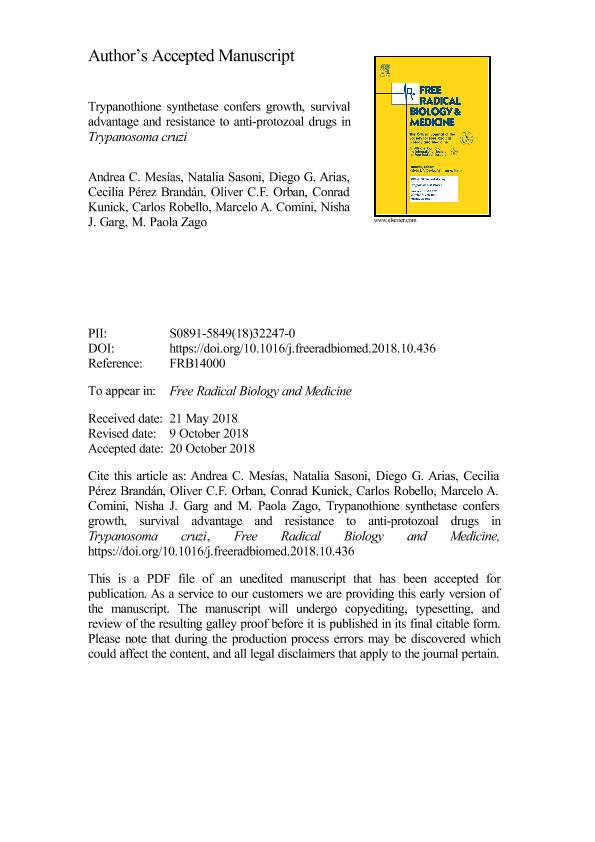Artículo
Trypanothione synthetase confers growth, survival advantage and resistance to anti-protozoal drugs in Trypanosoma cruzi
Mesias, Andrea Cecilia ; Sasoni, Natalia
; Sasoni, Natalia ; Arias, Diego Gustavo
; Arias, Diego Gustavo ; Pérez Brandan, Cecilia María
; Pérez Brandan, Cecilia María ; Orban, Oliver C. F.; Kunick, Conrad; Robello, Carlos; Comini, Marcelo; Garg, Nisha J.; Zago, María Paola
; Orban, Oliver C. F.; Kunick, Conrad; Robello, Carlos; Comini, Marcelo; Garg, Nisha J.; Zago, María Paola
 ; Sasoni, Natalia
; Sasoni, Natalia ; Arias, Diego Gustavo
; Arias, Diego Gustavo ; Pérez Brandan, Cecilia María
; Pérez Brandan, Cecilia María ; Orban, Oliver C. F.; Kunick, Conrad; Robello, Carlos; Comini, Marcelo; Garg, Nisha J.; Zago, María Paola
; Orban, Oliver C. F.; Kunick, Conrad; Robello, Carlos; Comini, Marcelo; Garg, Nisha J.; Zago, María Paola
Fecha de publicación:
01/2019
Editorial:
Elsevier Science Inc
Revista:
Free Radical Biology and Medicine
ISSN:
0891-5849
Idioma:
Inglés
Tipo de recurso:
Artículo publicado
Clasificación temática:
Resumen
Background: Chagas cardiomyopathy, caused by Trypanosoma cruzi infection, continues to be a neglected illness, and has a major impact on global health. The parasite undergoes several stages of morphological and biochemical changes during its life cycle, and utilizes an elaborated antioxidant network to overcome the oxidants barrier and establish infection in vector and mammalian hosts. Trypanothione synthetase (TryS) catalyzes the biosynthesis of glutathione-spermidine adduct trypanothione (T(SH)2) that is the principal intracellular thiol-redox metabolite in trypanosomatids. Methods and Results: We utilized genetic overexpression (TryShi) and pharmacological inhibition approaches to examine the role of TryS in T. cruzi proliferation, tolerance to oxidative stress and resistance to anti-protozoal drugs. Our data showed the expression and activity of TryS was increased in all morphological stages of TryShi (vs. control) parasites. In comparison to controls, the TryShi epimastigotes (insect stage) recorded shorter doubling time, and both epimastigotes and infective trypomastigotes of TryShi exhibited 36-71% higher resistance to H2O2 (50-1000 M) and heavy metal (1-500 M) toxicity. Treatment with TryS inhibitors (5-30 M) abolished the proliferation and survival advantages against H2O2 pressure in a dose-dependent manner in both TryShi and control parasites. Further, epimastigote and trypomastigote forms of TryShi (vs. control) T. cruzi tolerated higher doses of benznidazole and nifurtimox, the drugs currently administered for acute Chagas disease treatment. Conclusions: TryS is essential for proliferation and survival of T. cruzi under normal and oxidant stress conditions, and provides an advantage to the parasite to develop resistance against currently used antitrypanosomal drugs. TryS indispensability has been chemically validated with inhibitors that may be useful for drug combination therapy against Chagas disease.
Archivos asociados
Licencia
Identificadores
Colecciones
Articulos(IAL)
Articulos de INSTITUTO DE AGROBIOTECNOLOGIA DEL LITORAL
Articulos de INSTITUTO DE AGROBIOTECNOLOGIA DEL LITORAL
Articulos(IPE)
Articulos de INST.DE PATOLOGIA EXPERIMENTAL
Articulos de INST.DE PATOLOGIA EXPERIMENTAL
Citación
Mesias, Andrea Cecilia; Sasoni, Natalia; Arias, Diego Gustavo; Pérez Brandan, Cecilia María; Orban, Oliver C. F.; et al.; Trypanothione synthetase confers growth, survival advantage and resistance to anti-protozoal drugs in Trypanosoma cruzi; Elsevier Science Inc; Free Radical Biology and Medicine; 130; 1-2019; 23-34
Compartir
Altmétricas



